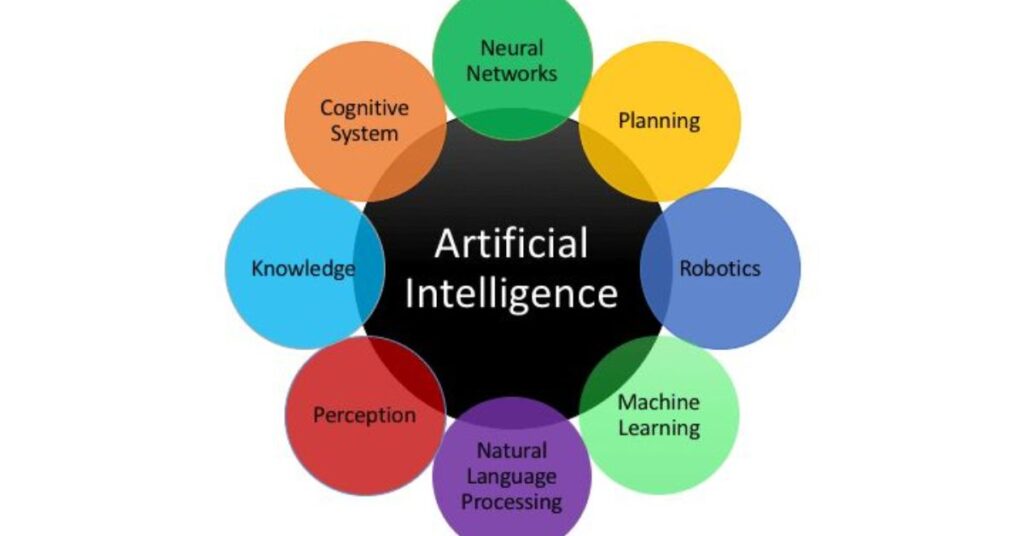The world of work is changing fast, with AI remote jobs leading the way. Technology keeps getting better, and jobs are changing, too. In 2024, AI remote work will become real, changing how we see our careers.
Imagine working with AI without being tied to one place. The old office is gone, replaced by a virtual one. Your value is determined by what you contribute, not by your location. This future is coming, where AI and remote work open up new possibilities.
Important points
- The rise of AI remote jobs in 2024 is changing the job world and opening up new opportunities for those with AI skills.
- Remote work with AI offers greater flexibility, improved productivity, and the ability to tap into a global talent pool. It’s a big win for everyone.
- Companies are looking for AI experts who can work from anywhere. This is driving the demand for remote AI jobs.
- To navigate the AI remote job market, you need to be informed about the trends, in-demand skills, and top companies.
- AI pros need the right tools and tech to thrive in a virtual setting. It’s all about being prepared.
The Current State of AI Remote Jobs: Market Overview and Trends

The AI remote jobs market is booming, offering many chances for those seeking AI jobs from home. As companies need more AI skills, they’re turning to remote positions.
Growth Statistics in the AI Job Market
Reports show the global AI job market could grow by over 28% from 2022 to 2027. This growth is due to AI’s increasing use in many fields. It’s creating a big need for skilled AI workers who can work from home.
Emerging Sectors for Remote AI Positions
- Healthcare and medical AI applications
- Financial technology and banking
- E-commerce and retail analytics
- Cybersecurity and data protection
- Logistics and supply chain optimization
Salary Trends for Remote AI Professionals
The pay for remote AI positions has gone up in recent years. This highlights the value of AI skills in the job market. Remote AI workers typically earn salaries ranging from $90,000 to $150,000 per year. Years of experience, skills, and industry influence salaries.
” With the boom of remote work — a whole world has opened up for the AI worker. We put people in touch with them who can work from home and help in a big way.
.
Essential Skills and Qualifications for Remote AI Positions

Remote AI jobs are becoming more popular, and employers are looking for skilled professionals. To land a remote AI job, you need technical and soft skills for remote work.
Technical skills are key. Knowing Python, R, and TensorFlow is important. Also, being good with machine learning, data analysis, and cloud computing like AWS or Azure helps a lot.
- Expertise in programming languages like Python, R, and TensorFlow
- Familiarity with machine learning algorithms and proficiency in data analysis techniques.
- Experience with cloud computing platforms (AWS, Google Cloud, Microsoft Azure)
Soft skills are also key. You need to be good at communicating, working alone, and staying motivated. These skills help you succeed in remote AI jobs.
- Excellent communication skills for remote collaboration
- Self-motivation and the ability to work independently
- Adaptability to transforming remote work environments
By improving your technical and soft skills, you’re ready for the remote AI jobs market. This will help you get jobs like AI developer or data science remote jobs.
“The future of work is remote, and the need for skilled AI professionals will keep growing. Investing in the right skills can lead to exciting remote AI engineer job opportunities.”
| Technical Skills | Soft Skills |
| Programming (Python, R, TensorFlow)Machine learning algorithms data analysis techniques computing platforms | Programming (Python, R, TensorFlow)Machine learning algorithms data analysis techniques computing platforms |
Top Industries Hiring for AI Remote Jobs

More industries are looking for AI talent to work remotely. Healthcare, financial technology (FinTech), and e-commerce are leading. They need experts in AI to help them grow.
Healthcare and Medical AI Applications
The healthcare world is quickly adopting AI. AI is used in healthcare for medical imaging, finding new drugs, and improving patient care. Jobs in healthcare AI include AI developers, medical analysts, and virtual assistants.
These roles are crucial for better patient care and more efficient healthcare systems.
Financial Technology and Banking
Financial companies and FinTech organizations utilize AI for various purposes, including fraud detection, enhancing customer service, and developing investment strategies. Remote jobs in this field include data analysts, trading specialists, and chatbot developers.
AI is changing the financial world. It’s making it a great place for remote AI jobs.
E-commerce and Retail Analytics
E-commerce and retail are using AI to improve customer experiences and supply chains. They also use AI to understand their data better. Jobs include predictive analytics, personalization engineers, and virtual assistants.
AI is helping these businesses stay competitive. It’s a big reason why they’re looking for remote AI talent.
As the AI industry remote work, AI remote work trends and remote work AI grow, these industries are leading the way. They see the value of artificial intelligence job openings and remote work. AI’s flexibility and ability to scale make it a crucial asset in these fields.
Understanding Different Types of Remote AI Roles

The job market is booming with AI careers from home and AI telecommute opportunities. These roles cover a wide range of tasks and skills. They meet the growing need for AI experts in many industries.
Machine Learning Engineers are in high demand. They design, build, and deploy AI models. These models power smart systems and apps, using data analytics and more.
AI job market growth has also increased the need for Data Scientists in remote jobs. They analyze data, create predictive models, and find insights that guide business decisions. They work with teams to make data useful.
Researchers have another key role. They explore new AI technologies and techniques. They work on advanced projects with universities and companies, pushing AI forward.
Remote job platforms for AI roles are also featuring AI Product Managers. They connect AI tech with business needs. AI Product Managers define product goals, collaborate with teams, and ensure AI products are developed and used effectively.
The AI job market growth is making more remote AI roles available. This offers many chances for those looking for flexible and fulfilling AI careers.
The future of work will be remote, with artificial intelligence (AI) significantly shaping that landscape. As the demand for AI talent continues to soar, the job market is witnessing a surge in flexible, location-independent opportunities that cater to the needs of both employers and professionals.”
You May Also Read this Blog;7 Artificial Intelligence (AI) Jobs You Can Pursue in 2024
Leading Companies Offering Remote AI Positions
The future of work is changing, and remote AI jobs are in high demand. Tech giants, startups, and big companies are all looking for remote AI talent. They offer a variety of jobs, from software engineering to natural language processing.
Tech Giants and Remote AI Opportunities
Big names like Google, Amazon, and Microsoft are leading the way in remote AI work. They want remote AI experts to join their teams for exciting projects. Working remotely here means good pay, significant benefits, and being part of top AI projects.
Startups Embracing Remote AI Talent
- AI and machine learning startups are also going remote, offering cool jobs for AI pros. Companies like Anthropic, Devi, and Covariant use remote work to tap into global talent. This helps them advance their research and development.
- Working for a startup in AI can be thrilling. You get to be part of a fast-paced team, help create new tech, and gain valuable experience in a growing field.
Global Corporations with AI Remote Teams
Big companies from all industries are also hiring remote AI talent. JP Morgan Chase, Walmart, and Johnson & Johnson have remote AI teams to help their businesses.
These companies offer remote AI jobs with extensive projects, teamwork, and chances to improve AI in big organizations.
How to Land Your First AI Remote Job

In the fast-changing world of AI, more remote work chances are popping up. If you’re looking for AI jobs with flexible hours, freelance AI positions, or high-paying AI remote jobs, you need to stand out. As someone aiming to be an AI professional for digital nomads, here are some effective ways to get your ideal AI remote job.
- Craft an interesting resume: Show off your tech skills, relevant projects, and any AI certifications. Make sure your resume fits each job you apply for, focusing on the skills they want.
- Build a Robust Portfolio: Display your AI projects, open-source work, and any new ideas you’ve come up with. A solid portfolio can make you unique and show your hands-on skills.
- Leverage Your Network: Meet industry pros, join AI groups online, and go to virtual events. Networking can lead to secret job openings and give you insights into the AI job market.
- Ace the Interview: Do your homework in the company and the role. Get ready for common AI interview questions. Talk about your tech skills, problem-solving, and love for AI.
The AI job scene is always changing, so keep up with new trends and skills. With a smart plan, a strong portfolio, and good networking, you’ll be on your way to your first AI remote job. This will kick-start an exciting career in AI.
Your response should be more comprehensive and address the likelihood that the future of work will be predominantly remote, with AI playing a central role. Take advantage. “It’s time to showcase your talent.”
Remote Work Tools and Technologies for AI Professionals

As the need for the best AI remote jobs for beginners and entry-level AI jobs from home grows, AI experts need the right tools. They must have cloud computing platforms and collaborative coding environments. These are key for a successful how to start a remote career in AI and high-paying artificial intelligence remote jobs.
Essential Software and Platforms
Remote AI work needs powerful computing resources. Cloud-based platforms like Amazon Web Services (AWS), Microsoft Azure, or Google Cloud Platform provide this. They offer scalable computing power, storage, and AI services, making it possible to work from anywhere.
Version control systems, such as Git and GitHub, are vital for remote AI teams. They enable seamless collaboration and code sharing. Specialized AI tools like Júpiter Notebooks, TensorFlow, and PyTorch are also crucial for remote model building and deployment.
Collaboration Tools for Remote AI Teams
- Video conferencing platforms like Zoom, Microsoft Teams, or Google Meet help with real-time communication.
- Cloud-based document editors, such as Google Docs or Microsoft Office 365, allow for simultaneous editing and sharing.
- Project management tools like Trello, Asana, or Jira help track tasks and deadlines, ensuring projects are delivered efficiently.
Security Considerations for Remote AI Work
Data security and privacy are essential considerations when working remotely. AI professionals should use secure VPNs and implement strong access controls and encryption. Regular software updates and strong cybersecurity practices are essential for protecting remote AI projects.
| Tool | Purpose | Key Features |
| AWS | Cloud computing platform | Scalable computing power, AI-specific services |
| GitHub | Version control system | Collaborative code sharing, project management |
| Zoom | Video conferencing | Real-time communication, screen sharing |
Salary Expectations and Benefits in AI Remote Jobs

The demand for remote AI experts is growing fast. It’s important to know what you can earn and what benefits you’ll get. Top companies offering remote jobs pay well, showing they value your skills and flexibility.
Salaries for remote AI jobs range from $80,000 to more than $150,000 per year. This depends on your experience, skills, and the project’s complexity. Many jobs also offer significant benefits like health insurance, retirement plans, and plenty of vacation time.
When you’re offered a remote AI job, be ready to talk about your skills and achievements. Discover the salary range for others in your position. It assists you in negotiating a higher salary. Additionally, working from home can save you money on commuting and let you live in cheaper places.
Conclusion
The rise of AI remote jobs in 2024 is transforming the way professionals work. It offers unmatched flexibility and access to high-paying opportunities across diverse industries. From healthcare to finance, and e-commerce to cybersecurity, AI talent is in high demand. By honing essential technical skills, staying adaptable, and mastering remote work tools, you can position yourself as a valuable asset in the AI job market.
Whether you’re aiming for a career in machine learning, data science, or AI engineering, remote AI work in the future presents numerous opportunities. Now is the time to explore the AI remote job landscape, seize the moment, and unlock the potential of working from anywhere in the world.
FAQ
Q: What are the key growth statistics in the AI job market?
A: The AI job market is growing fast. Reports show an enormous increase in demand for AI experts. Experts expect the global AI market to grow by over 38% from 2021 to 2026. This growth creates many remote job opportunities in AI.
Q: Which sectors are leading the charge in remote AI positions?
A: Healthcare, FinTech, e-commerce, and retail analytics are leading in remote AI jobs. These sectors use AI to improve operations and customer experiences. This leads to more remote AI job openings.
Q: What are the typical salary trends for remote AI professionals?
A: Remote AI salaries vary based on experience, skills, and location. However, the trend is up with competitive pay. Remote AI jobs can earn between $80,000 and $150,000 or more, depending on the role and expertise.
Q: What are the essential skills and qualifications required for remote AI positions?
A: To succeed in remote AI roles, you need skills in programming languages like Python. You also need knowledge in machine learning, data analysis, and statistical modeling. Good communication, problem-solving, and self-discipline are also key for remote work.
Q: What industries are most popular for coming to your system with AI remote jobs?
A: Healthcare and medical are leading in AI remote jobs, with tasks like medical imaging and drug discovery. FinTech is also hiring AI talent to improve fraud detection and personalized advice. E-commerce and retail analytics use remote AI to optimize supply chains and personalize customer experiences.
Q: What are the various types of remote AI job opportunities available?
A: There are many remote AI roles, including machine learning engineers and data scientists. Machine learning engineers develop AI models. Data scientists analyze data to find insights. AI researchers advance the field, and AI product managers connect tech with business needs.
Q: Which companies are offering remote AI positions?
A: Tech giants like Google, Amazon, and Microsoft offer remote AI jobs. They use their global presence to build AI teams. Startups and large corporations also offer remote AI jobs to drive innovation and digital transformation.
Q: How can I land my first remote AI job?
A: Create Your Strong Portfolio to Get the 1st Remote AI Job To land jobs, you need to not only network online but also at virtual events hosted by Peloton or other companies. Practice for remote capability in interviews. Work in entry-level positions so you can build your work experience.
Q: What tools and technologies are essential for working remotely in the field of artificial intelligence?
A: Remote AI workers need tools like cloud computing platforms and collaborative coding environments. Platforms like AWS and Júpiter Notebooks help teams work together. Management tools and secured data storage areas must too.
Q: What are the typical salary ranges and benefits for remote AI jobs?
A: Remote AI jobs often have competitive salaries, sometimes higher than on-site jobs. Salaries vary based on experience and role, but can be from $80,000 to $150,000 or more. Benefits include flexible schedules, health insurance, and growth opportunities.







